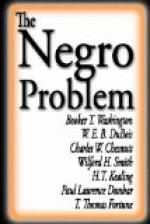destroyed, in large measure, that pride of ancestry
upon which pride of race must be builded. In no
other logical way can we account for the failure of
the Afro-American people to stand together, as other
oppressed races do, and have done, for the righting
of wrongs against them authorized by the laws of the
several states, if not by the Federal Constitution,
and sanctioned or tolerated by public opinion.
In nothing has this radical defect been more noticeable
since the War of the Rebellion than in the uniform
failure of the people to sustain such civic organizations
as exist and have existed, to test in the courts of
law and in the forum of public opinion the validity
of organic laws of States intended to deprive them
of the civil and political rights guaranteed to them
by the Federal Constitution. The two such organizations
of this character which have appealed to them are the
National Afro-American League, organized in Chicago,
in 1890, and the National Afro-American Council, organized
in Rochester, New York, out of the League, in 1898.
The latter organization still exists, the strongest
of its kind, but it has never commanded the sympathy
and support of the masses of the people, nor is there,
or has there been, substantial agreement and concert
of effort among the thoughtful men of the race along
these lines. They have been restrained by selfish,
personal and petty motives, while the constitutional
rights which vitalize their citizenship have been
“denied or abridged” by legislation of
certain of the States and by public opinion, even
as Nero fiddled while Rome burned. If they had
been actuated by a strong pride of ancestry and of
race, if they had felt that injury to one was injury
to all, if they had hung together instead of hanging
separately, their place in the civil and political
life of the Republic to-day would not be that, largely,
of pariahs, with none so poor as to do them honor,
but that of equality of right under the law enjoyed
by all other alien ethnic forces in our citizenship.
They who will not help themselves are usually not
helped by others. They who make a loud noise
and courageously contend for what is theirs, usually
enjoy the respect and confidence of their fellows
and get, in the end, what belongs to them, or a reasonable
modification of it.
As a consequence of inability to unite in thought and effort for the conservation of their civil and political rights, the Afro-American Negroes and colored people have lost, by fundamental enactments of the old slave-holding States, all of the civil and political rights guaranteed them by the Federal Constitution, in the full enjoyment of which they were from the adoption of the War Amendments up to 1876-7, when they were sacrificed by their Republican allies of the North and West, in the alienation of their State governments, in order to save the Presidency to Mr. Rutherford B. Hayes of Ohio. Their reverses in this matter in the old slave-holding States, coupled with a vast




